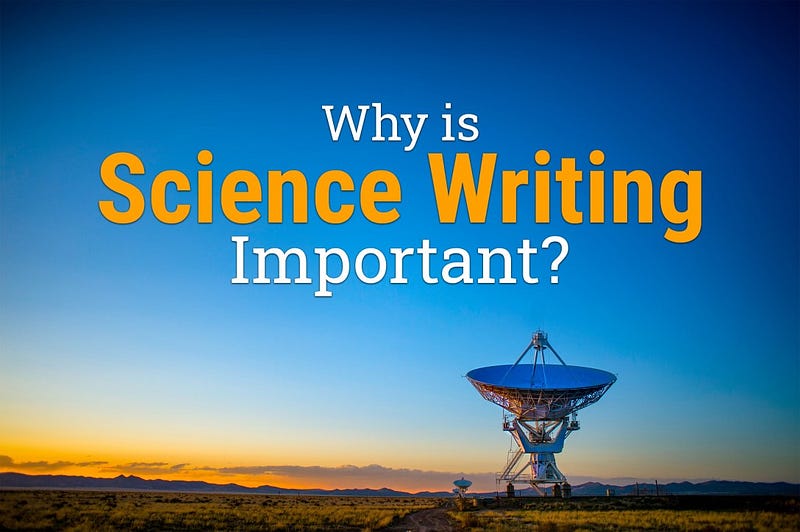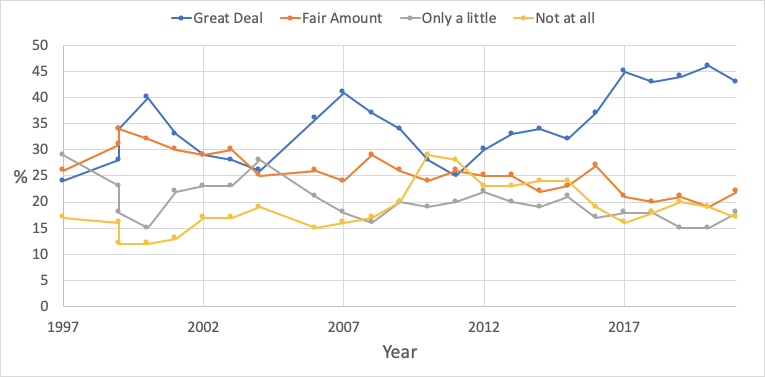Understanding the Significance of Science Writing
Written on
Science writing serves a vital purpose in connecting scientists with the general public. When scientific knowledge remains confined to laboratories, it loses its potential to make an impact. Through engaging narratives, writers transform complex scientific ideas into accessible content that can enhance societal understanding.
In practical terms, there are five key functions of science writing:
- Education: conveying scientific principles
- Information: keeping the public informed
- Persuasion: encouraging shifts in perspective or behavior
- Inspiration: showcasing the wonders of science
- Entertainment: creating enjoyable and engaging content
Let’s explore these functions further to understand why science writing is crucial.

Defining Science Writing, Scientific Communication, and Academic Writing
Before delving deeper, it's essential to clarify the terminology.
Science writing encompasses all written or scripted materials that include scientific themes, specifically intended for the public audience in this discussion.
Scientific communication refers to any method of conveying scientific ideas, which includes but is not limited to writing. It also involves demonstrations, workshops, and public relations initiatives.
Academic scientific writing, often referred to simply as "scientific writing," focuses on documenting scientific research for publication in scholarly journals, distinguishing it from content aimed at the broader public.
These terms can often be confused, and their application is inconsistent. For further insights into the differences between academic and non-academic science writing, I recommend checking out my previous article.
Educate — The Role of Science Writing in Teaching
Education is one of the primary functions of science writing. Each generation of scientists, medical professionals, and engineers relies on a wealth of educational resources. High-quality educational materials are vital for students to grasp complex concepts and thrive in their careers. Though it may lack glamour, educational science writing is indispensable.
The quintessential example of educational science writing is the science textbook. While they may not always be associated with individual authors, these texts are crafted by dedicated teams.
There is also a plethora of other educational resources available, including assignments, guides, and reference materials. Platforms like YouTube host numerous informative videos that cover a wide array of scientific subjects, showcasing the wealth of resources accessible today.
Is educational science writing limited to students? Certainly not! Adults, too, have scientific inquiries that need addressing. Articles that explain concepts, how-to guides, and documentaries are examples of educational science writing tailored for adult audiences.
Recommendation: I highly recommend Vox, which has played a pivotal role in popularizing the explainer format in digital journalism. While not exclusively focused on science, their science-related content is excellent. For instance, this video exemplifies educational content for adults:
Inform — Keeping the Public Informed and Combating Misinformation
The realm of science and technology is ever-evolving. The public needs to be aware of various developments, from new medical treatments to astronomical discoveries, as well as environmental issues and natural disasters. These occurrences are not just intellectually stimulating; they can significantly impact our daily lives. Thus, keeping the public informed is essential in contemporary society.
So, how is this information conveyed? Science writers adeptly translate scientific events into written materials, which can be categorized into three primary functions:
- Explanation: detailing the facts and circumstances
- Contextualization: discussing the significance of discoveries and the problems they address
- Amplification: highlighting scientific topics that warrant attention
Science journalism plays a crucial role in this process, identifying newsworthy stories, reporting factual information, and disseminating summaries to the public. While reporters are often associated with politics or crime, many focus on scientific stories, especially during critical times like the early stages of the pandemic.
Additionally, fact-checking is an increasingly vital function in the fight against misinformation. False claims and conspiracy theories can spread rapidly online, often fueled by influential figures. Science writers work to debunk inaccuracies, provide credible references, and offer necessary context.
Fact-checking is just one front in the battle against misinformation. Many dynamics are at play, but science writers are essential first responders when misleading scientific information circulates.
Recommended: The New York Times science desk consistently produces accurate content and often incorporates diagrams and multimedia elements that enhance their articles.
Persuade — Influencing Public Opinion and Personal Choices
Rachel Carson's "Silent Spring," published in 1962, examined the detrimental effects of the pesticide DDT on the environment and critiqued the chemical industry's claims. This influential book contributed to the DDT ban, the establishment of the EPA, and the growth of the environmental movement, earning its place as one of the most impactful non-fiction works.
While it may seem challenging for a single book to wield such influence today, it is evident that science writing can significantly affect public perception. Scientific arguments resonate with logical reasoning, enabling writers to shape discussions, influence policies, and alter behaviors.
Climate change is a prime example of how science writing has shifted public opinion. In 1997, only 24% of Americans expressed significant concern about climate change; this figure has since risen to nearly 50%. Science writers have played a pivotal role in this transformation.

Fiction that intertwines scientific elements (distinct from science fiction) can also impact public perception. For instance, Kim Stanley Robinson's "The Ministry of the Future" examines the implications of global warming on society, exploring both natural phenomena and their societal ramifications.
Persuasive science writing can also encourage changes in personal habits. Here is a partial list of topics where scientific arguments play a role:
- Diet
- Exercise
- Mental health
- Sleep
- Environmental sustainability
- Meditation
- Productivity
However, it’s important to note that not all advice blogs exemplify strong science writing. Some persuasive content lacks scientific rigor. Caution is warranted when non-experts utilize scientific claims, as they may cherry-pick or misinterpret data to support their viewpoints.
Recommended: Ezra Klein has produced exceptional work at Vox and The New York Times on subjects like meat consumption, alternatives, and veganism, adeptly balancing scientific and ethical considerations. His piece advocating for a "Moonshot for Meatless Meat" is a standout example of his writing.
Inspire — Finding Motivation Through Scientific Marvels
The natural world offers a profound source of inspiration, creativity, and awe. Whether contemplating the vastness of space or the intricate structures within our bodies, these feelings, though intangible, are incredibly valuable.
While nature is impressive on its own, science writers enrich our understanding by adding depth and detail. They illuminate the nuances, complexities, and scales of various topics, creating a beautiful fusion of poetry and science.
Notable scientists such as Albert Einstein, Alan Turing, and Marie Curie inspire and motivate with their groundbreaking contributions. Their stories provide insights into their thought processes, their work, and the evolution of scientific knowledge.
This inspiration also serves another purpose: promoting science. Scientists seek funding, respect, and talented students, and inspirational narratives act as marketing for science itself.
Recommendation: "The End of Everything (Astrophysically Speaking)" by Katie Mack explores the potential fates of the universe according to physics research. It offers a glimpse into the astounding and terrifying aspects of space. A brief review can be found here:
Entertainment — Sharing the Quirky and the Fascinating
While the world is filled with inspiration and educational opportunities, it is also replete with the bizarre and the extraordinary. Science writing serves to communicate these intriguing facts. There are no strict rules dictating that science writing must be serious; plenty of room exists for humorous, strange, and shocking content.
Entertainment plays a crucial role in making educational and informative content more engaging. Utilizing captivating examples and compelling stories can enhance the appeal of argumentative or inspirational writing. If you want your audience to engage with your work, infusing entertainment is essential.
Recommendation: XKCD, a long-established comic by Randall Munroe, explores various nerdy topics, including science. For a concentrated dose of entertaining science content, consider his "What If?" series, which has also inspired several books based on those explorations.
For example, here’s an illustration from Munroe's analysis of what would occur if you attempted to grab a pole while plummeting from a tall building at 100 mph:

The Distinction of Science Writing Compared to General Writing
At this juncture, you might be pondering what sets science writing apart from other forms of writing. The functions we’ve discussed can also manifest in general written content. What, then, does this signify regarding the unique importance of science writing?
This leads us back to an earlier question: what constitutes science writing? Is it a distinct category like "autobiography" or "romance"? Is it a subject matter? Or is it a tool used within written works? I would argue it encompasses all these aspects. Science serves various purposes across different writing styles, making it challenging to define precisely what distinguishes science writing.
However, for now, let's conclude that science writing is significant because it enhances our understanding and appreciation of the natural world. It is a versatile instrument with a unique ability to broaden perspectives.
This article was originally published here.